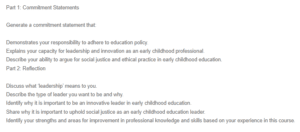Early Childhood Education Policy and Financing
Part 1: Commitment Statements
I am committed to education policy and ensuring that all early childhood programs adhere to the highest standards of social justice and ethical practice. I have the capacity for leadership and innovation that will allow me to ensure that all children, teachers, and parents are treated with respect and dignity. Universal access to high-quality early childhood education is an important issue, and I will do everything in my power to make sure that all children have access to it. I will use ethical practices like ensuring that I have appropriate relationships with families and parents (Alison, 2022). Social justice and child welfare are also very important to me, and I will fight against policies that will hurt children. I believe that it is important to ensure all children have access to a high-quality learning environment regardless of race, gender, ethnicity, or socioeconomic status. All students deserve an opportunity for success, and my role as an educator is crucial in ensuring students receive the best possible instruction. I will fulfil my role as a leader in education by advocating for social justice, educational equity, and ethical practice.
Part 2: Reflection
Leadership entails the ability to lead others and guide them through difficult situations. It encompasses a range of skills, including communication, facilitation, and collaboration. A leader has the capacity for innovation and the desire to make change happen in their community or organization (Neuman & Bennett, 2001). They possess strong interpersonal relationships with people around them to understand others’ needs better. As an early childhood teacher, it is important to continuously strive for leadership qualities to advocate for your students, families and colleagues.
I want to be a proactive, inclusive, and supportive leader of all students. I also want to be open-minded and willing to listen without judgment (Alison, 2022). My goal as an early childhood teacher is to become a principal at the school where I teach so that I can make positive changes within our school community.
Innovation is key in early childhood education because the field is constantly evolving. Teachers need to adapt to new changes and find ways to integrate new technologies into their classrooms. They also need to be creative in lesson planning and finding new ways to engage students in learning. As an early childhood educator, I must always be looking for new ways to improve my teaching practice. It can only be done if I continuously learn and participate in professional development opportunities.
It is important to uphold social justice in early childhood education because the field has a history of oppression and inequitable practices (Neuman & Bennett, 2001). As an educator, it is my responsibility to advocate for marginalized students or have special needs. I will do this by listening carefully to their concerns and working collaboratively with other teachers, administrators, and parents (Swindell, 2020). I will also do everything in my power to make sure that all children have access to a quality education regardless of race, gender, ethnicity, or socioeconomic status. It means ensuring there is equity within our school system so that students with disabilities receive adequate support services. At the same time, those who are growing up poor can attend pre-kindergarten programs.
My strengths are my desire to learn and my willingness to work hard to become an effective teacher leader. I am also a good communicator, which will help me in this role because so much collaboration goes into making sure students receive the best possible education. Areas for improvement include time management and organizational skills since these are not things that come naturally to me, but I am willing to work on them.
References
Alison, R. S. (2022). Early Care and Education 2020 State Legislative Action Report. Retrieved February 14, 2022, from https://www.ncsl.org/research/human-services/early-care-education-2020-state-legislative-action-report.aspx
Neuman, M. J., & Bennett, J. (2001). Starting strong: Policy implications for early childhood education and care in the US. Phi Delta Kappan, 83(3), 246-254.
Swindell, J. L. (2020). International early childhood education and care professionals practices to engage family members of young children with special education needs: a comparative study of professional practices in China and the United States (Doctoral dissertation, University of Illinois at Urbana-Champaign).
ORDER A PLAGIARISM-FREE PAPER HERE
We’ll write everything from scratch
Question

Early Childhood Education Policy and Financing
Part 1: Commitment Statements
Generate a commitment statement that:
Demonstrates your responsibility to adhere to education policy.
Explains your capacity for leadership and innovation as an early childhood professional.
Describe your ability to argue for social justice and ethical practice in early childhood education.
Part 2: Reflection
Discuss what ‘leadership’ means to you.
Describe the type of leader you want to be and why.
Identify why it is important to be an innovative leader in early childhood education.
Share why it is important to uphold social justice as an early childhood education leader.
Identify your strengths and areas for improvement in professional knowledge and skills based on your experience in this course.

